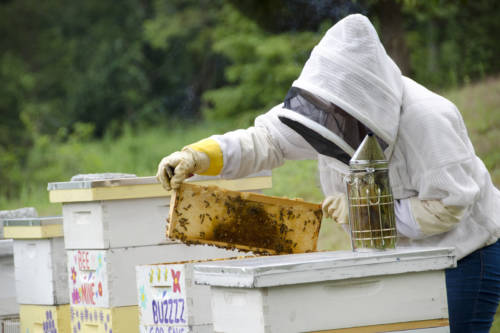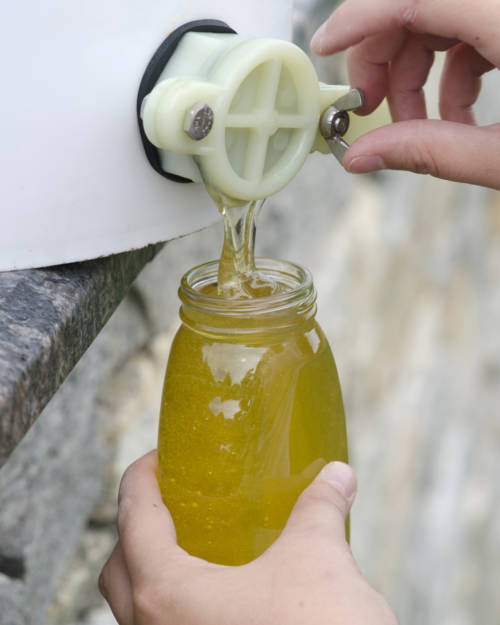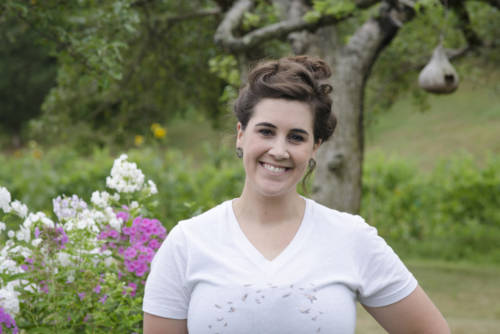
How Kayla Lambrou, “Hobby Beekeeper”, Got Into Honey
Kayla Lambrou began beekeeping about 12 years ago, but she claims that at the time it “was really a false start”.
“My dad and I decided to get bees to put on our property for pollination– we read a book and watched a few videos and that was that. We were very unsuccessful in our first year,” she tells us. “We really had no clue what we were doing, we thought we could just put a few hives in our backyard and they didn’t need much help. The bees died the first winter and we decided to let the hobby go– at least for a while. In the time after that, I always loved bees. Always loved reading about them and seeing them in my backyard, so about six years ago I convinced my dad to go to ‘Bee School’ with me. I had been doing a bit of research and it seemed that this was the right path we needed to take in order to get all the information possible.”
The notion that beekeeping is an art and skill best learned from others is an enduring principle in the trade. “For about a month, we would go to school every weekend and learn more and more about honey bees; it was definitely an information overload. But slowly we started to realize all the things we did wrong our first time around. Through the bee school we met a few people– and gained membership into The Rhode Island Beekeepers Association“– a resource Lambrou cites as being invaluable, and an experience– bee school– that she would recommend to any novice interested in getting involved with bees.
“The bee club has probably been the thing that has been most beneficial to us over the past five or so years of beekeeping,” she insists. “From the association we have met mentors and have a web of people we can call if there are any issues we are unsure about. In my opinion, you cannot be a successful beekeeper without having a support group of people to learn from.”
“Every year, through trial and error it seems, I learn more and more. You realize all the things you did wrong the year before– and learn from it. My biggest mentor is in his 70’s and he says he is always learning new things. From new research coming out– to just talking with other beekeepers, it is a field that is constantly in motion. We learn new things from the bees everyday!”
Lambrou is now 26 and makes an excellent peppermint beeswax lip balm, in addition to bottling a full array of beautiful Little Pond Honey (as it is labelled), which she sells casually when she isn’t working to promote bee education. “I am definitely a ‘hobby beekeeper’,” she reflects. “I have eight hives– all of which I constantly worry about on a daily basis. There is always something that needs to be done! Teaching elementary-aged kids about bees is always very fun. It seems that people are always very interested about honey bees and how incredible they are, but are a little squeamish to get up close and personal with them.”
“I’m always trying to remind people that if you want to save the bees, save the dandelions!”
“I think working on getting people aware of what a honey bee actually looks like– not a wasp or a yellow jacket– is my biggest goal at the moment.” (“Honeybees die when they sting you so they often don’t; wasps, on the other hand have a straight stinger like a needle, so they can just continuously sting you,” she points out. “It seems silly, but I feel that if people were to know what honeybees looked like– and how harmless they really are– there may be a more robust concern about why the bee population is in trouble.”
“My biggest thing is what I always tell people: if you see dandelions, do not spray them. Dandelions are a honey bees’ favorite food in the springtime. Dandelions are always the first thing to bloom in the spring, so that’s the honeybee’s first source of food in the spring– their first nectar source. You have all these people going around spraying Roundup on them, so bees will then take that nectar in and they’ll usually be poisoned pretty much right away, and they won’t be able to make their way back to the hive and they’ll die. So, that’s why I’m always trying to remind people that if you want to save the bees, save the dandelions!”




































